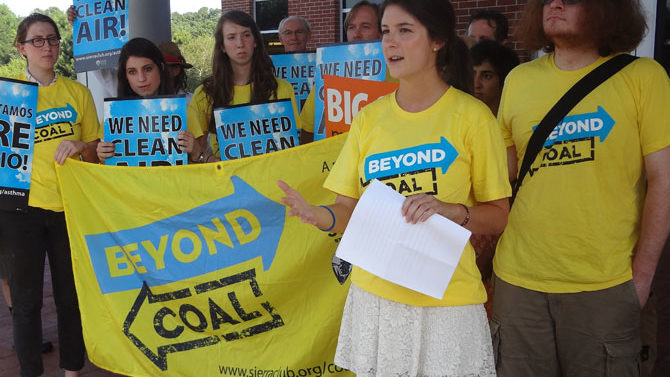One by one, University of Georgia students and other Athens residents got up and explained why they think UGA should ditch its polluting coal-fired boiler on campus.
UGA is seeking to renew a permit for the boiler, and environmental activists are pressuring the administration to replace it with something cleaner, like natural gas, biomass, solar, geothermal or some combination.
At a public hearing Tuesday, July 30 at the Athens-Clarke County Library, members of Beyond Coal and the Sierra Club Student Coalition, two related student groups, asked the Georgia Environmental Protection Division to force UGA to set a timetable for replacing the coal boiler within the next five years, when the permit will be up for renewal again. “We’re just pressuring them to make this a top priority for the school,” said Laura Toulme, a Beyond Coal executive board member.
What’s at Stake
Unfortunately, it’s not quite that simple. EPD has no authority to force UGA to replace the boiler as long as it meets federal emissions standards (which it does) and no matter how unpopular it is, according to Eric Cornwell, the program manager for EPD’s Stationary Source Permitting Program. “I think everybody wants clean air, but as far as the authority to force them to change, we do not have the authority,” he said.
The coal boiler is more than 50 years old, on its last legs and mainly operates during the winter, according to administrators. It’s one of 12 UGA facilities that require an environmental permit to operate. The others are three incinerators for animal carcasses and medical waste, a repair shop’s paint booth and seven newer boilers powered by natural gas.
The coal-fired boiler is classified as a “major source” of pollution according to U.S. Environmental Protection Agency standards, and it’s the single biggest source in Clarke County. According to testing done by a third party for UGA and EPD, the boiler emits 60 tons of poisonous carbon monoxide per year, 144 tons of smog-causing nitrogen oxide, 71 tons of particulate matter that causes heart and lung disease and 229 tons of sulfur dioxide, an ingredient in acid rain. A scrubber and baghouse installed several years ago reduced emissions significantly, especially acidic gases, said Anna Aponte, an EPD permitting engineer.
To put it in perspective, a coal-fired power plant puts out hundreds of times as much pollution as UGA’s coal boiler, and all the cars in Athens combined are a much bigger culprit than the boiler when it comes to local air quality.
Still, to Beyond Coal and Sierra Club members, the issue is symbolic. “I think it’s strange UGA still has a coal boiler,” David Littman said. “Colleges all over the world have alternative energy systems, and we don’t.”
And there may be other health effects beyond what’s measured as part of the permit application. Dale Kemmerick, a retired EPD air pollution meteorologist who lives in Duluth, called the testing “incomplete.”
As a school, UGA should be held to a higher standard, Kemmerick said at the public hearing. For example, the coal boiler emits about 20 pounds of lead per year—a number that might have been higher before new technology was installed—so the soil surrounding it could contain 1,000 pounds of lead or more. Yet testing the soil or the blood of people who work near the boiler for lead isn’t required. He also questioned whether anyone is testing pollution levels at the top floors of tall buildings on campus, where emission plumes can remain concentrated, rather than spreading out as they fall.
Administrators took Kemmerick’s comments to heart, said Kevin Kirsche, director of the UGA Office of Sustainability. “UGA has been very proactive in testing and ensuring compliance,” Kirsche said. “Since [those tests are] not required, I don’t think they’ve been done, but the general consensus is that’s a good idea and something we should look into.”
What’s Next
UGA administrators have given mixed signals about what they intend to replace the coal boiler with—something cleaner, or just another coal boiler.
Last August, a North Carolina State University study commissioned by the U.S. Department of Energy found several fuel alternatives, including timber scraps known as biomass. It called natural gas the best option from a financial and environmental standpoint.
Now-retired UGA President Michael Adams, though, threw cold water on alternative fuels in April, during one of his last press conferences. He said he didn’t want to rely on natural gas as the university’s sole source of heat and hot water. “Everybody is against coal until all the lights and heat go out,” he said. “You have to think these things through.”
Former Senior Vice President for Finance and Administration Tim Burgess added that a biomass boiler would bring two dozen tractor-trailers through campus each day, as opposed to the occasional coal-filled train, because it’s much less dense in energy.
After the NC State study was released, UGA issued a request for proposals for consultants to drill down in more detail. Kirsche said last week that the university was days away from signing a contract with Jacobs Engineering. “They’ve got a ton of experience with innovative steam plant design and construction,” he said.
Assuming the contract is finalized, Jacobs will have six months to give UGA up to five options for replacing the coal boiler. Reliability and cost will be factors along with the environmental impact. “We have to have a reliable system, and it has to be cost-effective,” Kirsche said.
The new system, whatever fuels it, could use waste heat to generate electricity in addition to steam. Every kilowatt-hour UGA could produce on its own is one not produced at a coal-fired Georgia Power plant, Kirsche said.
There is no timetable for replacing the coal boiler, because there is no funding for it yet, and Adams pegged the price tag at $80 million to $120 million. But Kirsche called Beyond Coal’s proposed five-year deadline feasible, if optimistic. “Things always happen very slowly because it’s a very significant infrastructure decision we’re making,” he said.
Much will depend on whether new President Jere Morehead puts his weight behind alternative fuels. He hasn’t said anything publicly, but Toulme believes he will support getting rid of coal.
“I definitely think President Adams was under a lot of political pressure,” she said. “… We’ve heard through various sources that President Morehead is open and sympathetic to environmental causes.”
Like what you just read? Support Flagpole by making a donation today. Every dollar you give helps fund our ongoing mission to provide Athens with quality, independent journalism.









